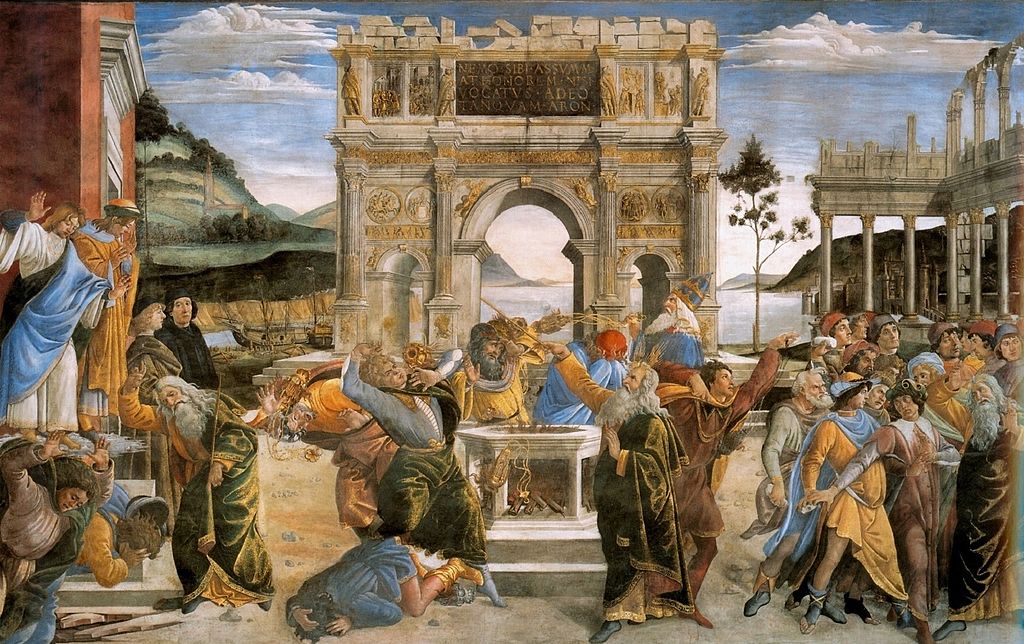
110 BC to 90 BC, Psalm 42: Alexander Jannaeus.
This site was first built in French (see www.147thgeneration.net). The English translation was mainly done using « google translation ». We have tried to correct the result of this translation to avoid interpretation errors. However, it is likely that there are unsatisfactory translations, do not hesitate to communicate them to us for correction.
(for that click on this paragraph)
Summary
This generation is from the years 110 BC to 90 BC
According to our count, this generation is the 42nd generation associated with Psalm 42. It is in this Psalm 42 that we therefore find an illustration of the facts of this generation.
This generation covers the end of the reign of John Hyrcanus, the short reign of Aristobulus I son of Jean Hyrcanus and the beginning of that of Alexander Jannaeus son of Jean Hyrcanus and brother of Aristobule I.
Until this generation, political power and religious power have always been separate. This generation marks a break in this direction.
Aristobulus, who was the eldest of the children of Hyrcanus and who was nicknamed Philelles, that is to say « lover of the Greeks », changes the principality of the Jews into a kingdom. He and thus is the first to be crowned king. Aristobule belongs to the Hamonéennen dynasty, whose founder is Mattathias, the first to revolt against the Greeks. Mattathias is also a priest of the priestly lineage, which Aristobulus inherits.
The only “contentious” case before was the Moses / Aaron couple. Moses had political power, Aaron had religious power, the two were brothers. What then provoked the revolt of Korah. But God judged that Moses, at the time of the challenge, had still preserved the balance of power.
So, when Korah presents himself to Moses for the dispute, the divine decision is unfavorable to him, the earth devours him, and those who accompanied him in the dispute. However, the complaint has been heard by God and God remains vigilant about how Moses and Aaron deal with their respective power. Thus their management of the Meribah water crisis will be fatal to them. Recall the origin of it.
But if Korah could not avoid death during his rebellion against Aaron and Moses, his descendants were spared and occupy a special place in the history of the people of Israel. The descendants of Korah, « the sons of Korah », were among the first to join David’s cause when he tried to resist Saul.
It is also logical, that in a spirit of justice towards their ancestor Korah, David let his sons speak for this generation. This marks the realization of the fears raised by Korah with Moses, on the accumulation of political and religious powers.
Since this is happening in this generation, it is “the sons of Korah” who take over from David in the writing of the psalms. The psalm of this generation (Psalm 42) up to Psalm 49, the psalm associated with generation 49. Generation 49 is the last generation in the presence of the Temple, the last where the priests have power, the last where the accumulation of political and religious powers still make sense. This Psalm 42 also initializes the second book of psalms.
Coming back to this generation, Aristobulus, who had all the honors of the priesthood, deviated by proclaiming himself king. This causes him to kill his own brother, and then takes him to death in a righteous act of repentance.
Alexander Jannaeus continues on this path leading to the intervention of foreign forces. In particular Cleopatra who ruled Egypt, and Ptolemy, who fled to Cyprus after being driven out of Egypt by Cleopatra. Ptolemy turns against Judea and devastates it. The battles waged by Alexander Jannaeus, because of his hazardous political choices, turned out to be deadly for the Jews.
Talk
The two powers
This generation covers the end of the reign of John Hyrcanus (134 BC / 104 BC), the short reign of Aristobulus I (104 BC / 103 BC) son of Jean Hyrcanus and the beginning of that of Alexander Jannaeus ( 103 BC / 76 BC) son of Jean Hyrcanus and brother of Aristobule I.
Before placing the psalm itself in relation to its generation, we must first look at the title of it.
We are at the beginning of the second book of psalms which marks a break with the first series of psalm, and this psalm is the first attributed to an author other than David himself. This one is indeed « signed » of the sons of Korah. We will first remember who Korah was and try to understand why he is involved in this psalm.
The challenge of Korah
Korah is the one who organized the rebellion against Moses and Aaron disputing that all powers are acquired to them:
- Korah[1] the son of Izhar, the son of Kohath, the son of Levi took [himself to one side] along with Dathan and Abiram, the sons of Eliab, and On the son of Peleth, descendants of Reuben.
- They confronted Moses together with two hundred and fifty men from the children of Israel, chieftains of the congregation, representatives of the assembly, men of repute.
- They assembled against Moses and Aaron, and said to them, « You take too much upon yourselves, for the entire congregation are all holy, and the Lord is in their midst. So why do you raise yourselves above the Lord’s assembly? »
In fact, Moses and Aaron combined the two powers, the political power (Moses) and the religious power (Aaron). Korea’s claim could be supported by the episode of the golden calf. Aaron did not spare[2] his people from the fault but, moreover, when Moses was accuser, oppressed the people instead of defending them as Moses had done before God.
However, strong of his irreproachable behavior, Moses did not hesitate to put himself in the balance to spare his people from the divine vengeance, in spite of the bonds of fraternity with Aaron he preserved the balance of the pair of the powers.
The waters of Meribah
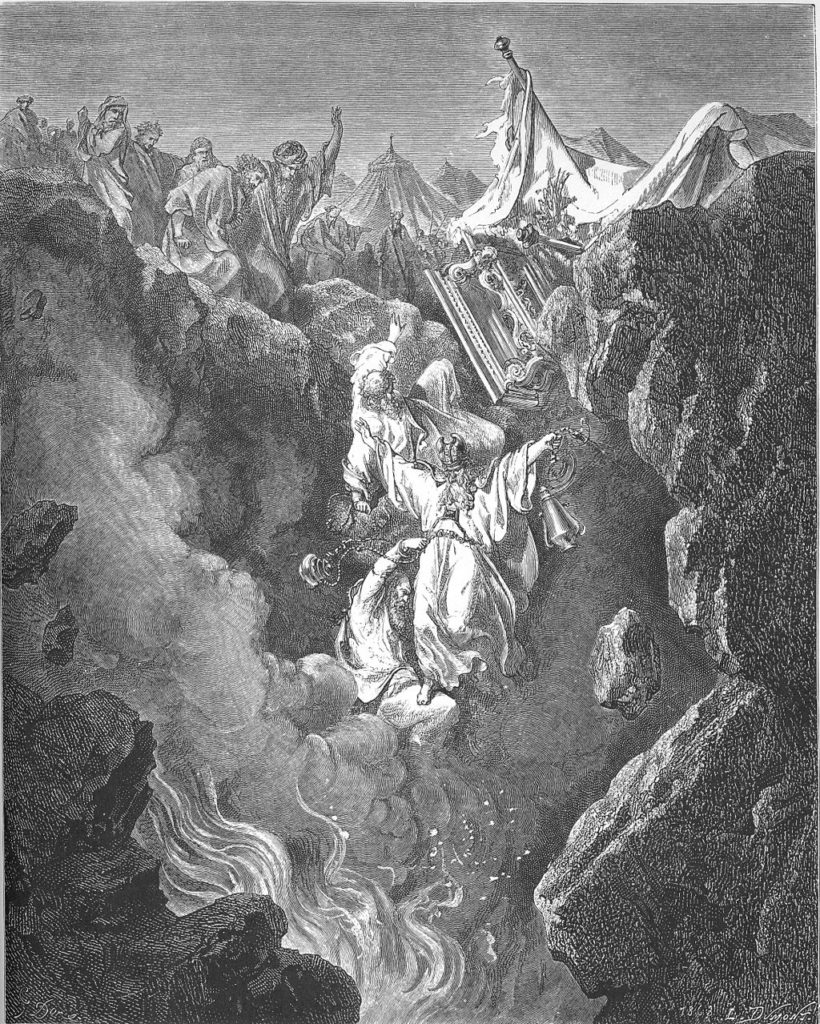
When Korah presents himself to Moses for the dispute, the divine decision is unfavorable to him, the earth devours him, and those who accompanied him in the dispute. However, the complaint has been heard by God and God remains vigilant about how Moses and Aaron deal with their respective power. Thus their management of the Meribah water crisis will be fatal to them. Recall the origin of it:
- The[3] entire congregation of the children of Israel arrived at the desert of Zin in the first month, and the people settled in Kadesh. Miriam died there and was buried there.
- The congregation had no water; so they assembled against Moses and Aaron.
- The people quarreled with Moses, and they said, « If only we had died with the death of our brothers before the Lord.
- Why have you brought the congregation of the Lord to this desert so that we and our livestock should die there?
- Why have you taken us out of Egypt to bring us to this evil place; it is not a place for seeds, or for fig trees, grapevines, or pomegranate trees, and there is no water to drink.
- Moses and Aaron moved away from the assembly to the entrance of the Tent of Meeting, and they fell on their faces. [Then] the glory of the Lord appeared to them.
Moses and Aaron then deviate from divine recommendations:
- The[4] Lord spoke to Moses, saying:
- « Take the staff and assemble the congregation, you and your brother Aaron, and speak to the rock in their presence so that it will give forth its water. You shall bring forth water for them from the rock and give the congregation and their livestock to drink. »
- Moses took the staff from before the Lord as He had commanded him.
- Moses and Aaron assembled the congregation in front of the rock, and he said to them, « Now listen, you rebels, can we draw water for you from this rock? »
- Moses raised his hand and struck the rock with his staff twice, when an abundance of water gushed forth, and the congregation and their livestock drank.
When Moses acts alone (he takes the rod) he acts according to the divine will, but as soon as he associates with Aaron he no longer respects it.
Moses and Aaron, in mourning for Miriam, no longer care for the people and let them die of thirst. When the people come to remember Moses and Aaron, they overwhelm them (the people are called « rebels »). As Aaron, alone, had done at the event of the golden calf, unlike Moses, alone, who on the contrary, had stood up for them at the same event.
Moses forgets his mission to sanctify the name of God, as that would have sufficed to meet the demands of the people. By expressing his anger, he acts in the opposite direction of this requested sanctification. The rock is the symbol of God’s attachment to his people, it is this rock, especially when associated with water, that enables the people of Israel to extricate themselves from the real world into the divine.
Moses, in the grip of emotion, shared with Aaron, twice turned this rock into an instrument of punishment for the people of Israel. The first time, when he asks the earth to swallow up Korah and the other protesters. And this time when he hits the rock to sanction the Meribah Waters rebellion.
Unfortunately[5], by this he attracts divine wrath. If God could only swallow Korah and the other protesters, the latter’s claim was well recorded. In fact, when Korah died, their censers became holy. They were associated with the altar thus showing that if their death was deserved, God had not been deaf to their request.
On the waters of Meribah, Moses and Aaron had just proved that the two powers, “political” and “religious”, could not be put in the same hand. This also includes the particular case of Moses and Aaron who were brothers and who thus necessarily had a community of interest.
The divine sanction was first the death of Aaron, almost as a continuation of the Meribah[6] affair. Eleazar, his son, took over the priesthood. This does not, however, completely erase the kinship between Moses and the high priest. The only solution then was also death, or at least the replacement of Moses at the head of his people, since the priesthood had been promised to the line of Aaron. This is how Joshua takes over from Moses.
When the passing of the torch takes place, Moses recalls that it was indeed following the events of Meribah that this passage became mandatory:
- The[7] Lord was also angry with me (it’s Moses speaking) because of you, saying, « Neither will you go there.
- But Joshua the son of Nun, who stands before you he will go there; strengthen him, for he will cause Israel to inherit it.
The separation of powers
Subsequently, until this generation, political power and religious power have always been separated:
- Joshua had political power while Eleazar took care of the divine,
- During the conquest of the land of Israel, the « judges » succeed one another at the head of the people of Israel while the religious power is concentrated in Silo outside the intrigues of power,
- The first king of Israel, Saul, is associated with Samuel who takes charge of the religious dimension,
- His successor David is associated in turn with Nathan who does not fail to remind him of his homework,
- Solomon is associated with Azaryahu who is in charge of high priest,
And so on until the destruction of the first Temple.
When returning to the land of Israel, once again the pontifical office was independent of the governmental office. Upon the arrival of the Maccabean dynasty, the separation of powers was less clear, but until the generation that interests us none of the successors of Mattathias had dared to proclaim himself king thus avoiding the official accumulation of priestly and royal powers.
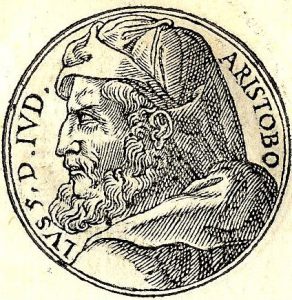
This balance of powers is broken, in the generation that interests us, which is the one associated with the first psalm of the second book of Psalms, by Aristobulus who is crowned king. Thus, a descendant of Aaron, of the lineage of the high priests officially takes the political power in Israel thus coming to justify a few centuries later the fears emitted by Korah.
- Now[8] when their father Hyrcanus was dead, the eldest son Aristobulus (who was nicknamed Philelles, that is to say, a lover of the Greeks), intending to change the government into a kingdom, for so he resolved to do, first of all put a diadem on his head, four hundred eighty and one years and three months after the people had been delivered from the Babylonish slavery, and were returned to their own country again.
The sons of Korah.
But if Korah could not avoid death during his rebellion against Aaron and Moses, his descendants were spared and occupy a special place in the history of the people of Israel:
- And[9] the earth opened its mouth and swallowed them and Korah, when that assembly died, and when fire destroyed two hundred and fifty men, and they became a sign.
- Korah’s sons, however, did not die.
Then:
- These[10] were the families of Levi: the family of the Libnites, the family of the Hebronites, the family of the Mahlites, the family of the Mushites, the family of the Korahites and Kehat begot Amram.
The descendants of Korah, the sons of Korah, were among the first to join David’s cause when he tried to resist Saul:
- And[11] these are the ones who came to David to Ziklag, while he was still hiding from Saul the son of Kish, and they were among the mighty men who aided the war.
- Armed with bows, shooting with the right and left hands, with stones and with arrows in the bow, of Saul’s brethren of Benjamin.
- The chief, Ahiezer, and Joash, the sons of Hashemaah the Gibeathite, and Jeziel, and Pelet, the sons of Azmaveth and Berachah, and Jehu the Anathothite.
- And Ishmaiah the Gibeonite, the mightiest of the thirty and over the thirty.
- And Jeremiah, and Jahaziel, and Johanan, and Jozabad the Gederathite, Eleuzai, and Jerimoth, and Bealiah, and Shemariah, and Shephatiah the Haruphite.
- Elkanah, and Ishiah, and Azarel, and Joezer, and Jashobeam, the Korahites.
- And Joela, and Zebadiah, the sons of Jeroham of Gedud.
It is also logical, that in a spirit of justice towards their ancestor Korah, David let his sons speak for this generation. This marks the realization of the fears raised by Korah with Moses.
This delegation of David, in the account of the generations of the people of Israel, is all the more legitimate as the sons of Korah have a tradition of chanting:
- And[12] these are the ones that David stationed to sing in the House of the Lord since the Ark was deposited.
- And they were ministering before the Tabernacle of the Tent of Meeting with song until Solomon built the House of the Lord in Jerusalem, and they stood according to their custom at their service.
- And these are those who stood [at their stations] and their sons; of the sons of the Kehathites, Heman the singer, the son of Joel, the son of Samuel.
- The son of Elkanah, the son of Jeroham, the son of Eliel, the son of Toah.
- The son of Zuph, the son of Elkanah, the son of Mahath, the son of Amasai.
- The son of Elkanah, the son of Joel, the son of Azariah, the son of Zephaniah.
- The son of Tahath, the son of Assir, the son of Ebiasaph, the son of Korah.
- The son of Izhar, the son of Kehath, the son of Levi, the son of Israel.
We also find them, as cantors during the reign of Jehoshaphat:
- And[13] Jehoshaphat bowed upon his face to the ground, and all the Judeans and the inhabitants of Jerusalem fell before the Lord to prostrate themselves to the Lord.
- And the Levites of the sons of the Kehathites and of the sons of the Korahites arose to praise the Lord, the God of Israel, with an exceedingly loud voice.
The Psalms of the Sons of Korah
All of these facts justify the intervention of the sons of Korah in the story of the generations of the people of Israel and the specific title of this psalm:

- For the conductor, a maskil of the sons of Korah.
It is still the sons of Korah who will recite the following psalms.
Explicitly for Psalms forty-four to forty-nine since quoted as authors in prologue of each of these psalms. Implicitly for the next Psalm, Psalm 43, since no author will be quoted. We will see for this psalm that the fact that no author is quoted simply means that it is in the logical sequence of present psalm since it is interested in the second part of the long reign of Alexander Jannaeus.
We had already had this principle of « consecutive psalms » for Psalms nine and ten, which were also marked by the long reign of King Ouzzia.
The psalm forty-nine that ends this series of psalms recited by the sons of Korah is the last psalm of the first watch of the night, the last psalm where the Jewish people live in the presence of the Temple, in the presence of the priesthood of the high priest who officiate at the Temple in accordance with the prescriptions of Leviticus.
This last psalm will be the one of the last generation to undergo a curse evoked in Leviticus.
The sons of Korah who have just spoken to initiate the second book of Psalms and to accompany the planned destruction of the Temple can only evoke the painful future of the Jewish people outside this Temple, that is to say after that one will be destroyed at the fiftieth generation and that the Jewish people will thus return in the second watch of the night.
The first watch, if it was terrible for the Jewish people, had the advantage by the presence of the Temple to keep a strong bond between God and his people.
For the second watch, this link, at least in appearance, will be destroyed. If in the first watch, the Jewish people often failed to be destroyed, their bond with God had never really been challenged by their enemies.
Aristobulus
By proclaiming himself king, Aristobulus weakens the role of the high priest and thus increases the importance of Jewish sects such as the Pharisees, Sadducees and Essenes who no longer need to be associated with the priesthood to make followers. If all these sects, and more particularly that of the Pharisees, will help the survival of Judaism in the synagogues outside the Temple, they will be a breeding ground for the appearance of Christianity. This one helped by the Roman power which already marks his hegemony will denigrate quickly Judaism. It will be the same for Islam a few centuries later.
The second book of psalms that integrates the generations of the destruction of the second Temple also incorporates the final dispersion of the Jewish people into the nations. Nations which, around the other two monotheistic religions that are Christianity and Islam, will appropriate the worship of the only God considering the Jewish people as the chosen people – or at least the people having been elected – but also as a people fallen, abandoned by his God.
It is therefore in this global perspective of the future of the Jewish people that we must interpret the beginning of the psalm of our generation:

- As a hart cries longingly for rivulets of water, …
- As we have already indicated (Psalm 22), the hart symbolizes God in his relationship with his people. He has moved away from his people, but this is not definitive, and God will eventually forgive his people and come closer to them. In this context, the stream symbolizes the passage of time and therefore the future times when God will remember his people.
- … so does my soul cry longingly to You, O God.
- My soul thirsts for God, for the living God; when will I come and appear before God?
- My tears were my bread day and night …
- The sons of Korah, who speak in the name of the people, look forward to this time of reunion with God. Because during the long night of the Jewish people, this one suffers long suffering. Day and night, because the psalms of Korah evoke the generations of the night but are inspired during the stay in the cave of Adulam, when the Jewish people is not yet in the night, so still in the day
- … when they say to me all day long, « Where is your God? »
- This mocking question will be the lot of the Jews throughout the end of the night from the nations among whom they will stay.
Aristobulus[14], the son of Hyrcanus, who had just proclaimed himself king, was the victim of a conspiracy to believe that his brother Antigone wanted to take his place. He had him killed. This crime disturbed Aristobulus:
- Aristobulus[15] soon was touched by such repentance for having taken away his brother’s life as his illness did not increase much. He reproached himself continually for having committed so great a crime; and her grief was so violent that she made him vomit a lot of blood. As one of his officers prevailed, it happened, as I believe by divine permission, that he let himself fall and spread some of it to the same place where the traces of the blood of Antigonus still appeared. Those who saw him, thinking that he was doing it on purpose, uttered such a loud cry that he was heard from the king. He asked them the cause; and no one said it to him, he desired even more to know it, because men naturally enter into distrust of what they try to hide from them, and imagine it worse than it is. Thus Aristobulus compelled them by his threats to tell them the truth: and she made such a strong impression on his mind that, after having shed many tears, he said with a deep sigh: « It seems that I have not been able to hide from God such a detestable action, since he is exercising his just vengeance against me. Until when will this miserable body retain my criminal soul? and is it not better to die all at once, than to shed my blood thus by drop, to offer it as a sacrifice of atonement to the memory of those to whom I so cruelly lost my life? ? In finishing these words, he died, having only reigned a year.
Aristobulus, who had all the honors of the priesthood, deviated by proclaiming himself king.
This attitude was detrimental to him since it led him to kill his own brother, and then took him to death in a just repentance action.
This is what the continuation of the psalm expresses:

- These things I will remember, and I will pour out my soul [because of the pain which is] upon me, how I passed on with the throng; I walked slowly with them until the house of God with a joyful shouting and thanksgiving, a celebrating multitude.
- Why are you downcast, my soul, and why do you stir within me?
Alexander Jannaeus
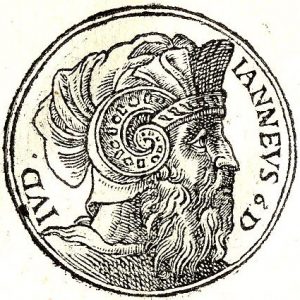
His successor, Alexander Jannaeus then takes power:
- When[16] Aristobulus was dead, his wife Salome, who, by the Greeks, was called Alexandra, let his brethren out of prison, (for Aristobulus had kept them in bonds, as we have said already,) and made Alexander Janneus king, who was the superior in age and in moderation.
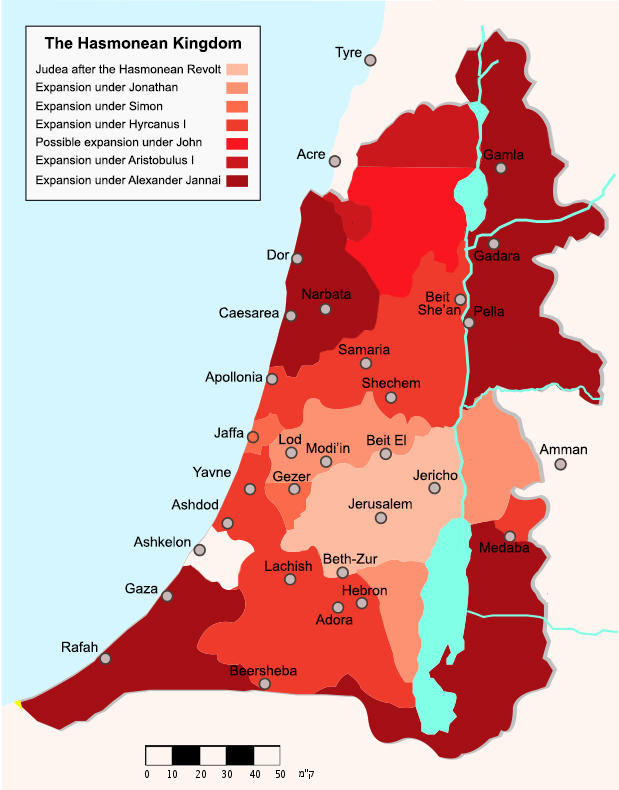
Aristobulus, in his short reign, had, by his military action, made it possible to consolidate the frontiers of Judea. Alexander Jannaeus will continue in this way. He attacked[17] the coastal cities, Ptolemais and Gaza, which still escaped the control of Judea.
Cleopatra
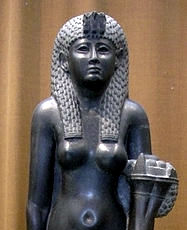
This struggle led to the intervention of foreign forces, particularly Cleopatra, who ruled Egypt, and Ptolemy, who fled to Cyprus after being driven out of Egypt by Cleopatra. This resulted in Ptolemy turning against Judea and devastating her.
The battles engaged by Alexander Jannaeus, because of his hazardous political choices, proved deadly for the Jews:
- Ptolemy[18] willingly made an alliance with Alexander, and arrested Zoe (who had made himself master of a city and coveted Ptolemais). But when he learned that this prince (Alexander) had secretly sent his mother to the queen, he broke with him, and besieged Ptolemais, who, as we have seen, had refused to receive him. He left some of his leaders with some of his forces to continue this siege, and went with the rest to ravage Judea. Alexander, on his side, assembled to oppose him an army of fifty thousand men, or according to others of eighty thousand, and Ptolemy, having one Sabbath day unexpectedly attacked the city of Azoth in the Galilee. He took it by storm and took ten thousand slaves with booty. After Ptolemy Latur had taken Azoth by force, he went to Sephoris, which is not far off, and gave an assault, but he was repulsed with great loss; and instead of continuing this siege, he went out to meet Alexander, King of the Jews, and met him near Asoph, who was near the Jordan, and encamped opposite him. […] The Jews, astonished at this change (after having had the advantage, the battle turns to the advantage of Ptolemy) and seeing no help from any of them, fled and all the others following their example. The enemies pursued them so violently and made such carnage that they did not stop killing until they were tired of striking. The number of deaths was thirty thousand; and according to Tymagene’s report of fifty thousand. The rest of the army was captured or saved by flight.
- In consequence of so great a victory and such a long pursuit, Ptolemy retired in the evening in some towns of Judea, and finding them full of women and children, he commanded his soldiers to slaughter them, to to put them in pieces and throw them into boilers of boiling water, so that when the Jews escaped from the battle would come to this place they would believe that their enemies ate human flesh and conceive of them by this means a greater fright.
The beginning of the reign of Alexander justifies the continuation of the psalm declined by the sons of Korah:

- Hope to God, for I will yet thank Him for the salvations of His presence.
- Even though the fate of the Jews of Judea is not enviable, the sons of Korah keep their trust in God.
- My God, my soul is downcast upon me; therefore, I will remember You from the land of Jordan and the peaks of Hermon, from the young mountain.
- These places are the theater of the terrible battles suffered by the Jews of Judaea to this generation.
- Deep calls to deep to the sound of Your water channels; all Your breakers and waves passed over me.
- The unfortunate fate of the Jews of Judea will not be enough, because Alexander Jannaeus will turn against his own people in turn making many victims.
The devotion of the sons of Korah will not make them lose hope in God. Their global vision of the future of the Jewish people through the generations of the night makes them glimpse of the many misfortunes that will befall him and the outrageous attitude of nations towards him.
But these visions also make them see that at the end of this night, God will return to his people who will thus forget all the cries of the night, whether they be those of this generation or those of the next ones.
This is the object of the end of the psalm:

- By day, may the Lord command His kindness, and at night, may His resting place be with me, a prayer to the God of my life.
- I will say to God, my Rock, « Why have You forgotten me? Why should I walk in gloom under the oppression of the enemy? »
- With murder in my bones, my oppressors have reproached me by saying to me all day long, « Where is your God? »
- Why are you downcast, my soul, and why do you stir within me? Hope to God, for I will yet thank Him for the salvations of my countenance and my God.

[1] Bamidbar – Numbers – Chapter 16, verses 1 to 3
[2] Shemot – Exodus – Chapter 32, verses 22 and following.
[3] Bamidbar – Numbers – Chapter 20, verses 1 to 6
[4] Bamidbar – Numbers – Chapter 20, verses 7 to 11
[5] Bamidbar – Numbers – Chapter 17
[6] Bamidbar – Numbers – Chapter 20, verses 22 to 29
[7] Devarim – Deuteronomy – Chapter 1, verses 37 and 38
[8] Flavius Josephus / Jewish Antiquities / Book thirteenth / chapter 11
[9] Bamidbar – Numbers – Chapter 26, verses 10 and 11
[10] Bamidbar – Numbers – Chapter 26, verse 58
[11] Divrei Hayamim I – I Chronicles – Chapter 12, verses 1 to 7
[12] Divrei Hayamim I – I Chronicles – Chapter 6, verses 16 to 23
[13] Divrei Hayamim II – II Chronicles – Chapter 20, verses 18 and 19
[14] Flavius Josephus / Jewish Antiquities / Book thirteenth / chapter 19
[15] Flavius Josephus / Jewish Antiquities / Book thirteenth / chapter 19
[16] Flavius Josephus / Jewish Antiquities / Book thirteenth / chapter 13 (12)
[17] Flavius Josephus / Jewish Antiquities / Book thirteenth / chapter 13 (12)
[18] Flavius Josephus / Jewish Antiquities / Book thirteenth / chapter 20 and 21
